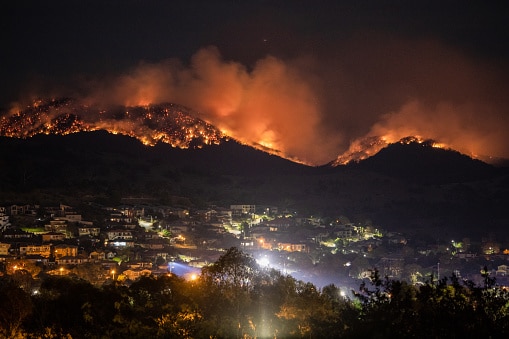Under a new law the ACT Legislative Assembly passed this week, community clubs can become refuges for Canberrans during bushfires and extreme heat and smoke events: places where community members can find respite and relief during emergencies.
“We’re living through a climate change emergency, and it is critical that we make refuges available for the community during extreme events such as heat waves and bushfires,” Attorney-General Shane Rattenbury said. “It’s especially important for vulnerable Canberrans who may be at a greater risk of heat stress or breathing difficulties.”
The law was introduced in December. At the time, Mr Rattenbury remarked that heatwaves kill more Australians than any other natural disaster, because heat stress can worsen diabetes, kidney disease, and heart disease. He argued that clubs made suitable refuges because they were spread across the ACT; offered good access and ready respite; and had ventilation and air-cooling systems many people did not have at home.
- ACT clubs will become refuges from heat and smoke (1 December 2022)
“These venues provide our community with access to climate-controlled spaces that aren’t always available in homes,” Mr Rattenbury said yesterday. “By allowing community clubs to become heat and smoke refuges, Canberrans will have access to nearby respite, no matter which side of the lake they live on.”
The amendments to the Gambling and Racing Control (Code of Practice) Regulation 2002 require that if a club refuge declaration is in force for the licensee’s club, the licensee must make a refuge area available to a person who accesses the club as a refuge. The refuge must be separate from the gaming area, and the licensee must not serve alcohol in the refuge area.
Craig Shannon, CEO of ClubsACT, welcomed the transparency the legislation provided, but said that it simply put a regulatory framework around what clubs were already doing. During the 2019/20 bushfires, he pointed out, clubs already provided refuge.
“We will work through the provisions, and hopefully when the time comes, we will be able to work with government to provide safe facilities for the community,” Mr Shannon said.
Mr Shannon was concerned that overregulation might be a disincentive for clubs to get involved.
“Where it is reasonable regulation, club members will be happy to comply,” he said.
“The problem with overregulating things is that sometimes it makes it difficult for clubs to provide this kind of support…
“Now our members will have to make an assessment on the viability of operating the venue as a refuge against the terms of their regulatory requirements.”
For instance, Labor MLA Dr Marisa Paterson and the ACT Council of Social Service (ACTCOSS) had proposed last year that the service of alcohol and all gambling activity in clubs designated as refuges should cease while emergency declarations were in place, so that self-excluded people could seek refuge there.
But Mr Shannon said he was not aware there were any alcohol or gambling issues while the clubs provided refuge facilities.
The new amendments require a gambling contact officer for the club to present while the club is used as a refuge.
“When people are seeking refuge, particularly when it prescribes they are meant to be in an area away from gaming and alcohol, why would you need to have a gambling contact officer there?” Mr Shannon wondered.
“Our members do not see being a refuge as a business opportunity; it’s a community support situation. [Alcohol and gambling] are already regulated in terms of the premise.”
While the declaration is in force, clubs will be entitled to claim some expenses arising from their use as a refuge as community purpose contributions.
Mr Shannon considers this will be necessary in some cases for facilities to open up as refuges; they might incur costs from staying open overnight, for instance.
Clubs must also let people know of alternative refuge venues, such as libraries, that they can use.
Members of the Heat and Smoke Refuge Working Group – which involves two gambling harm reduction experts and two club representatives from the Community Clubs Ministerial Advisory Council – will continue to assist the ACT Government’s implementation of the club refuge program.
Mr Shannon said the club sector had been working with the government on the process for the last 18 months.
The framework for clubs to operate as refuges will be in place for the 2023/24 bushfire season.
Mr Rattenbury said this initiative delivers on a Parliamentary and Governing Agreement commitment to support clubs to become heat and smoke refuges for local communities.



